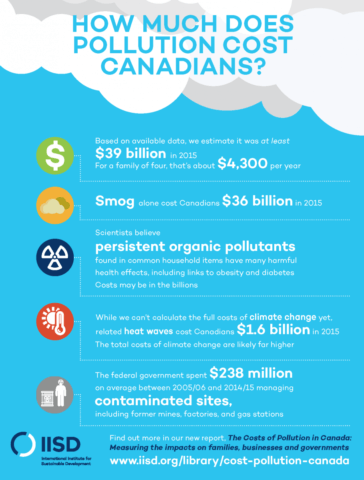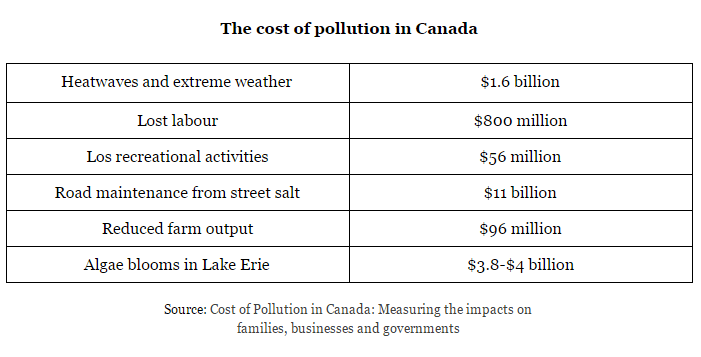A new report released by the International Institute for Sustainable Development (IISD) shows that pollution – everything from city smog to salt runoff – is costing Canadians tens of billions of dollars every year.
The report, “Cost of Pollution in Canada: Measuring the impact on families, businesses and governments,” summarizes studies that have put price tags on various forms of pollution. Pollution is defined in the report as anything that is released into the environment by human activity. This includes everything from car exhaust, greenhouse gas emissions and pesticides to fertilizers and plastic additives.
“We’re talking big bucks here – big, big bucks being sucked out of the economy,” said Robert Smith in an interview with the Toronto Star. Smith is a senior associate with the International Institute for Sustainable Development who authored the study with his colleague, Kieran McDougal. “The public needs to know what these costs are.”
The IISD’s methodology was scrutinized and approved by the Conference Board of Canada. Smith said their cost estimates are considered “conservative” given the lack of research around certain pollutants, not included in the report, that could carry a significant cost.

The report says pollutants lead to financial damages in three specific ways:
- Pollution can harm Canadians’ health and well being by lowering their enjoyment of life, making them sick, and, in extreme cases, leading to premature death;
- Pollution costs families, businesses and governments money straight out of their pockets — when people get sick from pollution, they need treatment; and,
- Pollution can reduce the value of the assets that make up Canadians’ wealth. For example, cottage properties are less valuable when they sit on lakes that are thick with algae, farmland drops in value when crops are harder to grow because of air pollution, and forests are less productive when damaged by acid rain.
Smith and McDougal argue that pollution is leading to higher healthcare costs and more expensive raw materials, food, and public services. It also adds to the bills from treating dirty water, lost labour output from people getting sick, honeybee deaths and reduced agricultural output.
 With the report serving as a starting point, the authors say more research needs to be done so that Canadians get a better idea of how much pollution is actually costing them. Areas include costs of greenhouse gas emissions that cause climate change, the health effects of heavy metals and persistent organic pollutants, and fertilizers and other runoff that can promote the growth of algae blooms in bodies of freshwater.
With the report serving as a starting point, the authors say more research needs to be done so that Canadians get a better idea of how much pollution is actually costing them. Areas include costs of greenhouse gas emissions that cause climate change, the health effects of heavy metals and persistent organic pollutants, and fertilizers and other runoff that can promote the growth of algae blooms in bodies of freshwater.
“The costs are high. The costs are real. The costs are going to be ongoing, and we don’t know enough about the costs, so we better get on with understanding them better,” Smith said.

